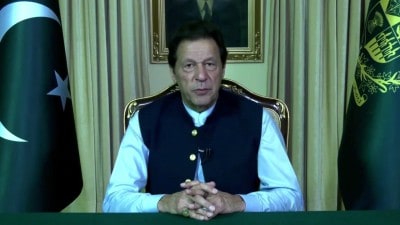By SPS Pannu
New Delhi, Sep 27 : Former Pakistan Prime Minister Nawaz Sharif has virtually dropped a bombshell on the Imran Khan government by openly stating that the country was on the verge of being blacklisted by the FATF because it had been forced by the military leadership to get “involved in external issues”.
Sharif, whose third term as Prime Minister extended from 2013 to 2017, had incurred the wrath of the generals as they did not want him to take action against Islamist militants who were being used by the army to carry out cross-border terror attacks in India and Afghanistan. Consequently, Sharif was hounded and had to eventually quit.
“When we pointed out that our friendly countries were warning us about our involvement in external issues which was being done at the behest of the military, we were attacked and it was turned into a scandal,” a Reuters report from Islamabad quoted Sharif as saying. He was addressing a Pakistani opposition parties conference on Sunday via a video link from London.
“Now, Pakistan has to deal with the shame of trying to meet targets set by platforms like the FATF,” Sharif said. He was referring to the Financial Action Task Force which is the global watchdog working to combat money laundering and terror finance.
“The military’s interference has reached a point where, from being a state within a state, it was now a state above the state. This is the root cause of all our problems,” the former PM said.
Sharif’s statement comes at a time when Pakistan is desperately trying to avoid being blacklisted by the FATF at a meeting scheduled for next month. In the FATF meeting in February, Pakistan had gained an extra four months to comply with international anti-terrorism financing norms but was warned that if it failed to fall in line it would be blacklisted. The FATF said it was concerned that Islamabad had again failed to complete an internationally agreed action plan.
Inclusion on the FATF blacklist would put Pakistan in the same category as Iran and North Korea and mean it would not be able to get any loans from international financial institutions such as the IMF and the World Bank. It would also face problems in financial dealings with other countries.
Although Sharif was removed as prime minister by a Supreme Court ruling against him over allegations of amassing personal wealth, it is an open secret in Pakistan that the army exercises considerable influence over the judiciary as well.
For most of Pakistan’s history, there has been either a military dictator at the helm of affairs or, when there was an elected government, a parallel government was being run by the military, Sharif also said at the conference which was attended by leaders of nearly all major opposition parties.
“Our struggle isn’t against Imran Khan but with the forces that have installed his illegitimate government to power. While political leaders were consistently victimised in the name of accountability, army dictators got away despite subverting the Constitution and committing all sorts of crimes,” he added.
In contrast, he said, there were no accountability proceedings against army generals and gave the example of Asim Saleem Bajwa, a retired general and now head of the China Pakistan Economic Corridor Authority, whose illicit wealth was exposed by the media but no action was taken.
“We want elected leaders to run the affairs of the country, to manage the economy and to decide on the foreign policy,” said Sharif.
He also criticized the Imran Khan government’s foreign policy, saying Pakistan has become internationally isolated. He took foreign minister Shah Mehmood Qureshi to task for straining Pakistan’s relations with Saudi Arabia and the Organisation of Islamic Cooperation over the Kashmir issue. Sharif said the country’s economy had crashed, inflation is up while the Pakistani rupee is at a historic low and economic growth had slowed down sharply.
Sharif also demanded accountability of Khan’s own assets, the overseas assets of his sister and of those close to the Prime Minister who had benefited from the sugar shortage in the country.
An angry Imran Khan, on his part, has said that allowing Sharif to leave the country for medical treatment in the UK was a mistake and his government regretted the decision. Sharif was allowed to go to London in November last year after the Lahore High Court granted him a four-week permission to go abroad for treatment.
Khan has admitted in a TV interview that an Arab royal had asked the government to let Sharif leave, but did not divulge any name saying it involved “international relations”.
(This content is being carried under an arrangement with indianarrative.com)
Disclaimer: This story is auto-generated from IANS service.

